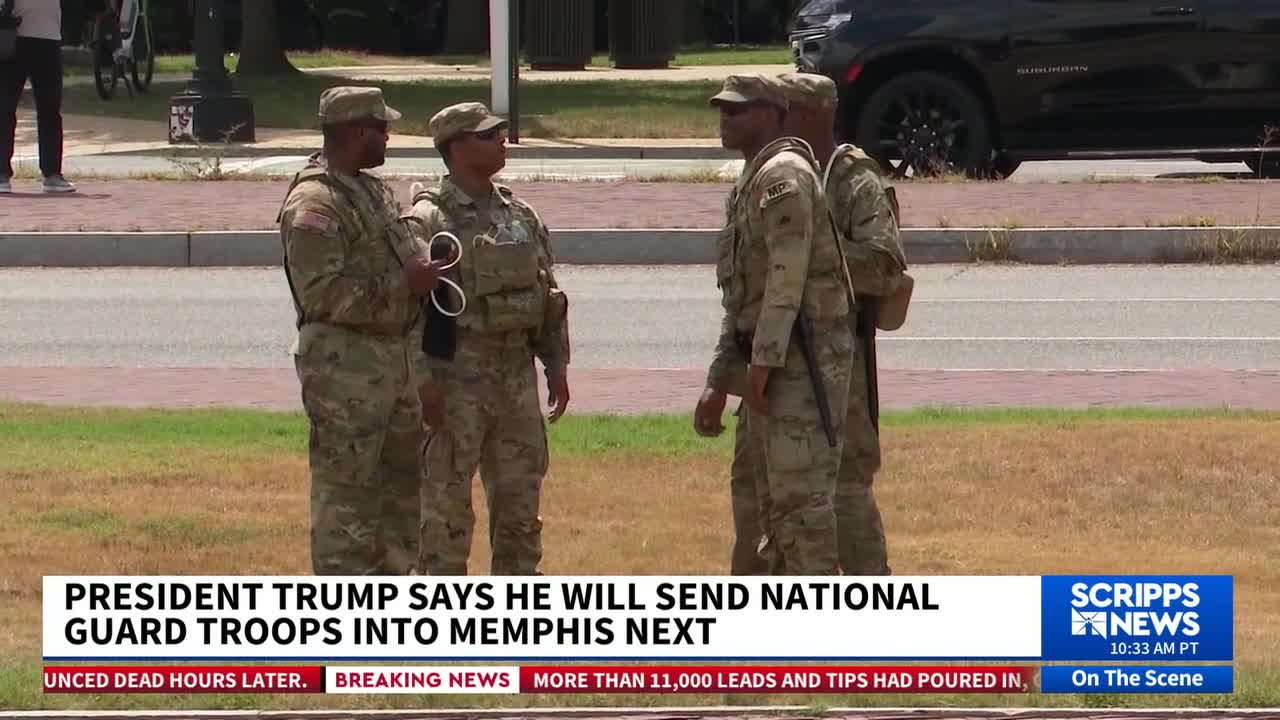President Donald Trump said Friday he'll send the National Guard to address crime concerns in Memphis with support from the mayor and Tennessee's governor, making it his latest expansion of military forces into American cities that has tested the limits of presidential power and drawn sharp criticism from local leaders.
Speaking on Fox News, Trump said "the mayor is happy" and "the governor is happy" about the pending deployment. The city is "deeply troubled," he said, adding, "we're going to fix that just like we did Washington," where he's sent the National Guard and surged federal law enforcement.
Memphis is a majority-Black city and has a Democratic mayor, who did not immediately respond to a request for comment. Republican Gov. Bill Lee confirmed Friday that he was working with the Trump administration to deploy National Guard troops to Memphis as part of a new crime-fighting mission.
The governor said he planned to speak with the president on Friday to work out details of the mission and was working with Trump's team to determine the most effective roles for the Tennessee National Guard, Federal Bureau of Investigation, Tennessee Highway Patrol, Memphis Police Department and other law enforcement agencies.
Trump on Friday said he decided to send troops into Memphis after Union Pacific's CEO Jim Vena, who used to regularly visit the city when he served on the board of FedEx, urged him earlier this week to address crime in the city.
Since sending the National Guard to Los Angeles and Washington, D.C., Trump has openly mused about sending troops to some of the nation's most Democratic cities — including Chicago and Baltimore — even as data shows most violent crime in those places and around the country has declined in recent years.
Trump has also suggested he could send troops to New Orleans, another Democratic-run city in a Republican-leaning state.
Crime is down, but troops may be coming
The president's announcement came just days after Memphis police reported decreases across all major crime categories in the first eight months of 2025 compared to the same period in previous years. Overall crime hit a 25-year low, while murder hit a six-year low, police said.
Asked Friday if city and state officials had requested a National Guard deployment -- or had formally signed off on it -- the White House didn't answer. It also didn't offer a possible timeline or say whether federal law enforcement would be surged in connection with a guard deployment to Memphis, as happened when troops were deployed to Washington.
Trump said Friday that he "would have preferred going to Chicago," where local politicians have fiercely resisted his plans, but suggested the city was too "hostile" with "professional agitators."
Officials in Tennessee appear divided
Republican state Sen. Brent Taylor, who backs the Memphis troop deployment, said Friday the National Guard could provide "administrative and logistical support" to law enforcement and allow local officers to focus on policework. Republican U.S. Sen. Marsha Blackburn also voiced her approval.
The Democratic mayor of Shelby County, which includes the city of Memphis, criticized Trump's proposal. "Mr. President, no one here is 'happy,'" said Mayor Lee Harris. "Not happy at all with occupation, armored vehicles, semi-automatic weapons, and military personnel in fatigues."
Republican Gov. Bill Lee said Wednesday that an ongoing FBI operation alongside state and local law enforcement had already made "hundreds of arrests targeting the most violent offenders." He also said there are record levels of Tennessee Highway Patrol troopers in Shelby County, including a newly announced additional 50 troopers.
"We are actively discussing the next phase of our strategy to accelerate the positive momentum that's already underway, and nothing is off the table," Lee said in the statement.
On Thursday, Memphis Mayor Paul Young said he learned earlier this week that the governor and Trump were considering the deployment in Memphis.
"I am committed to working to ensure any efforts strengthen our community and build on our progress," Young's statement said. What the city needs most, he said, is money for intervention and crime prevention, as well as more officers on patrol and support for bolstering the police department's investigations.
Some Republicans, including Taylor, the state senator, have asked the Tennessee Bureau of Investigation to audit the Memphis Police Department's crime reporting.
Trump's broader National Guard strategy
Trump first deployed troops to Los Angeles in early June over Democratic Gov. Gavin Newsom's objections by putting the California National Guard under federal jurisdiction, known as Title 10, to protect federal property from protests over immigration raids. The guard later helped protect officers during immigration arrests.
Alongside 4,000 guard members, 700 active duty Marines were also sent, and California sued over the intervention.
In Washington, D.C., where the president directly commands the National Guard, Trump has used troops for everything from armed patrols to trash cleanup without any legal issues.
RELATED STORY | Trump renews National Guard threat to Chicago, citing weekend killings
Chicago is on edge
Trump's comments underscored his shift away from threats to send troops into Chicago. Illinois Gov. JB Pritzker and Mayor Brandon Johnson, both Democrats, vowed legal action to block any such move.
Pritzker, a potential 2028 presidential contender, has said a federal intervention is not justified or wanted in Chicago. U.S. Attorney General Pam Bondi this week accused state leaders of being uncooperative.
"We want Chicago to ask us for the help and they're not going to do that," she told reporters after an unrelated event near Chicago where federal agents seized vaping products.
Even without National Guard troops, residents in Chicago are expecting more federal immigration enforcement. The Department of Homeland Security launched a new operation this week, with federal officials confirming 13 people with prior criminal arrests had been detained. However, it's still unclear what role that operation would play more broadly.











